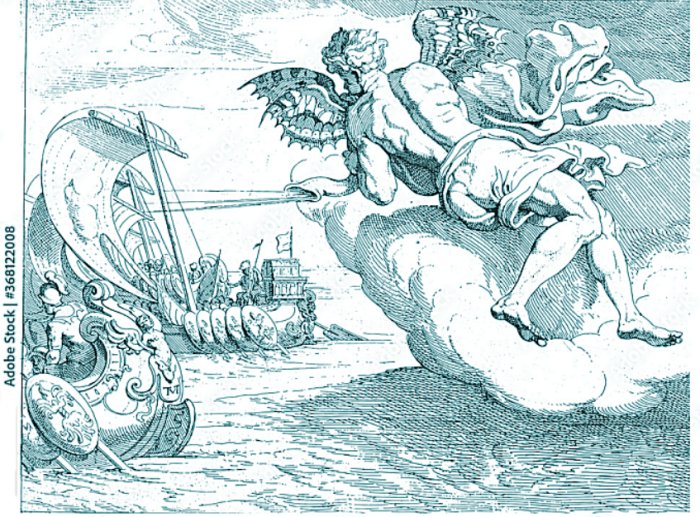Powerful Winds In Ancient Beliefs
A. Sutherland - AncientPages.com - In ancient beliefs, the winds were of divine origin, but not everyone agreed on the place of their residence and lineage.
However, many agreed, through the ages, that the winds helped gods and goddesses in different, often most extraordinary situations. They also helped and endangered people.
Zephyrus blows Odysseus ship forward. Credit: Adobe Stock - Morphart
One of them was a highly respected and powerful goddess, Artemis. When Agamemnon, one of the legendary warriors of the Trojan War in the Iliad, once offended Artemis, she took revenge against him by calming the winds that bore Agamemnon's fleet toward Troy.
The gods of the four principal winds (northern, southern, eastern, and western) were Boreas, Notos, Zephyr, and Euros. All four Anemoi – were believed to be the sons of Astraeus, god of the dusk and the goddess of the dawn Eos.
Most often, Thrace located in Southeast Europe, was believed to represent the homeland of the winds. Above all, Boreas has his palace of the sky, while other winds dwell in various caverns. Boreas is the most powerful and most dangerous of them.
Homer's Odyssey mentions a beautiful story about the winds and a fabulous land called Aeolia, probably located on one of the Aeolian Islands, north of Sicily. Aeolia was a floating island surrounded by bronze ramparts. It was a true fortress.
Aeolia was the home to Aeolus (Ajolos), who was the best friend of the gods and the king of the winds. He had twelve children: six daughters and six sons. He married them to himself so that they would not be parted from each other, and they lived in wealth and happiness. Zeus has put all the winds under his guard as sometimes, he has to calm them; sometimes, he orders them to blow again.
However, he must keep an eye on them all the time. Otherwise, they could break free from their bonds and wreak havoc on Earth.
In one story, Poseidon put a spell upon Odysseus, a legendary Greek king of Ithaca and the hero of Homer's epic poem, the Odyssey.
Odysseus should wander the seas for at least a decade. But this time, he had much luck when they stayed with the master of the winds, Aeolus, who offered him a bottle containing all the winds except the one that would take him back to Ithaca. The ships came just in sight of Ithaca, and everything was going fine, but not all the way home.
Unfortunately, Odysseus' companions opened the bottle while he was asleep and released all the winds. Most probably, in the bottle, they expected to find treasures instead. The winds immediately caused a furious storm that drove the ship far away from Ithaca and back to Aeolia.
Eventually, Odysseus and his crew found the master Aeolus again, but this time, he refused to help them further.
Worshiping Of Winds Has Deep Roots In Antiquity
The worship of the winds was widespread, especially among farmers and sailors. Near the seashore, the shrines and chapels were built by worshippers of the winds.
The tower of the winds. Credit: Joanbanjo - CC BY-SA 3.0
Art, especially bas-reliefs and paintings, is often associated with the gods of the winds.
The most famous monument is the octagonal Tower of the Winds in Athens, adorned with a frieze showing the eight winds. This building housed a horologium, a water clock that showed the exact time.
The winds – our eternal companions that we experience daily - are memorized in ancient myths and thanks to a beautiful tower in Athens.
Let's now look into the Slavic beliefs in the power of winds. The Slavs had slightly different beliefs about winds. The patron saint of the wind was Stribog (in Polish: Strzybóg). The one who is the link between the three worlds. Some believed that the wind was good and even divine. As a deity, it had a human personality and was respected as associated with good and evil, harvest, or war. It was a divine power ensuring prosperity and fertility.
In pagan times, the Slavs believed the wind symbolized changeability and ensured fertility and prosperity.
Also, Triglav, another powerful Slavic deity, was responsible for sea conditions. Sailors made offerings to the gods of the wind and asked for good weather during their boat journeys.
Written by – A. Sutherland - AncientPages.com Senior Staff Writer
Copyright © AncientPages.com All rights reserved. This material may not be published, broadcast, rewritten or redistributed in whole or part without the written permission of AncientPages.com
Expand for referencesReferences:
Phillips, Martin R., Mythology
Hamilton Edith, Mythology
More From Ancient Pages
-
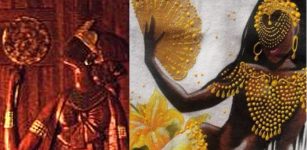 Oshun Goddess Of Yoruba People Who Brings All Things That Make Life Worth Living
African Mythology | Mar 29, 2019
Oshun Goddess Of Yoruba People Who Brings All Things That Make Life Worth Living
African Mythology | Mar 29, 2019 -
 Unknown Ancient History Of Antarctica And It’s Lost Civilization – Secrets Beneath The Ice
Ancient Mysteries | Sep 7, 2015
Unknown Ancient History Of Antarctica And It’s Lost Civilization – Secrets Beneath The Ice
Ancient Mysteries | Sep 7, 2015 -
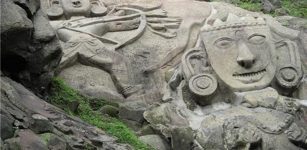 Mysterious Ancient Sculptures Of Unakoti And The Curse Of God Shiva
Featured Stories | Jul 18, 2017
Mysterious Ancient Sculptures Of Unakoti And The Curse Of God Shiva
Featured Stories | Jul 18, 2017 -
 Ancient Cities Built By Biblical Giants – Archaeological Evidence
Ancient Mysteries | Jun 2, 2018
Ancient Cities Built By Biblical Giants – Archaeological Evidence
Ancient Mysteries | Jun 2, 2018 -
 Mystery Of Count St. Germain – He Claimed To Have Lived For Several Centuries
Ancient Mysteries | Sep 4, 2014
Mystery Of Count St. Germain – He Claimed To Have Lived For Several Centuries
Ancient Mysteries | Sep 4, 2014 -
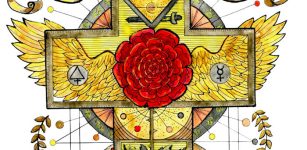 Rosicrucians: Facts And History About The Mysterious Secret Society
Featured Stories | Oct 20, 2016
Rosicrucians: Facts And History About The Mysterious Secret Society
Featured Stories | Oct 20, 2016 -
 Polycarp Of Smyrna: Burned At The Stake And Pierced With A Dagger
Featured Stories | Jun 25, 2020
Polycarp Of Smyrna: Burned At The Stake And Pierced With A Dagger
Featured Stories | Jun 25, 2020 -
 How Emma Of Normandy Risked Her Life To Save England
Featured Stories | Jun 30, 2025
How Emma Of Normandy Risked Her Life To Save England
Featured Stories | Jun 30, 2025 -
 Who Was The Sapa Inca?
Featured Stories | Jul 29, 2024
Who Was The Sapa Inca?
Featured Stories | Jul 29, 2024 -
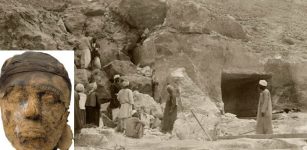 Mystery Of Egyptian Tomb 10A And The Mummy’s Head – A 4,000-Year-Old Crime
Featured Stories | Apr 27, 2022
Mystery Of Egyptian Tomb 10A And The Mummy’s Head – A 4,000-Year-Old Crime
Featured Stories | Apr 27, 2022 -
 Perchta: Evil Witch Of The Alps – An Old Tradition That Still Continues
Christmas Traditions | Dec 16, 2024
Perchta: Evil Witch Of The Alps – An Old Tradition That Still Continues
Christmas Traditions | Dec 16, 2024 -
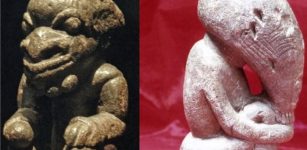 Monstrous Nomoli Figures Left By Unknown Culture That Vanished Long Ago
Artifacts | Mar 13, 2023
Monstrous Nomoli Figures Left By Unknown Culture That Vanished Long Ago
Artifacts | Mar 13, 2023 -
 Perplexing Accounts Of Ancient People Who Demonstrated Incredible Powers Of The Human Mind
Featured Stories | Feb 1, 2019
Perplexing Accounts Of Ancient People Who Demonstrated Incredible Powers Of The Human Mind
Featured Stories | Feb 1, 2019 -
 Is Mysterious Pokaini Forest An Ancient Healing Center And Anomalous Zone?
Featured Stories | Aug 13, 2018
Is Mysterious Pokaini Forest An Ancient Healing Center And Anomalous Zone?
Featured Stories | Aug 13, 2018 -
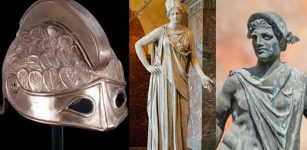 Magical Cap Of Invisibility Worn By Athena, Hades, Hermes, And Perseus
Featured Stories | Mar 25, 2019
Magical Cap Of Invisibility Worn By Athena, Hades, Hermes, And Perseus
Featured Stories | Mar 25, 2019 -
 Evidence Of An Unknown Ancient Civilization In The Yucatan?
Featured Stories | Apr 6, 2024
Evidence Of An Unknown Ancient Civilization In The Yucatan?
Featured Stories | Apr 6, 2024 -
 The Magnificent Yule Goat In Gävle, Sweden Has Finally Arrived
Christmas Traditions | Dec 2, 2024
The Magnificent Yule Goat In Gävle, Sweden Has Finally Arrived
Christmas Traditions | Dec 2, 2024 -
 Motilla del Azuer: Impressive And Unusual 3,200-Year-Old Fortress
Featured Stories | Nov 13, 2018
Motilla del Azuer: Impressive And Unusual 3,200-Year-Old Fortress
Featured Stories | Nov 13, 2018 -
 Subterranean Kingdom Of Shahmaran And The Land Of The Snakes
Featured Stories | Aug 17, 2020
Subterranean Kingdom Of Shahmaran And The Land Of The Snakes
Featured Stories | Aug 17, 2020 -
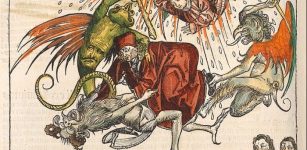 Simon Magus ‘The Magician’ Who Faked Death And Resurrection
Featured Stories | Feb 17, 2022
Simon Magus ‘The Magician’ Who Faked Death And Resurrection
Featured Stories | Feb 17, 2022

